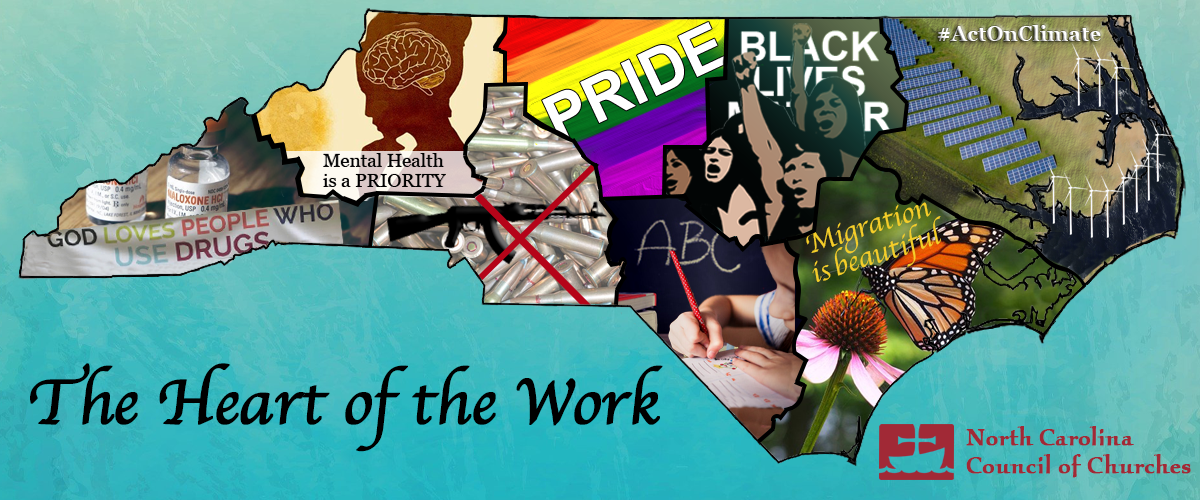Excerpted from The Heart of the Work, an Advent Guide for Lectionary Year B from the North Carolina Council of Churches.
Isaiah 61:1-4, 8-11
The Spirit of the Sovereign Lord is on me,
because the Lord has anointed me
to proclaim good news to the poor.
He has sent me to bind up the brokenhearted,
to proclaim freedom for the captives
and release from darkness for the prisoners,
to proclaim the year of the Lord’s favor
and the day of vengeance of our God,
to comfort all who mourn,
and provide for those who grieve in Zion—
to bestow on them a crown of beauty
instead of ashes,
the oil of joy
instead of mourning,
and a garment of praise
instead of a spirit of despair.
They will be called oaks of righteousness,
a planting of the Lord
for the display of his splendor.
They will rebuild the ancient ruins
and restore the places long devastated;
they will renew the ruined cities
that have been devastated for generations…
For I, the Lord, love justice;
I hate robbery and wrongdoing.
In my faithfulness I will reward my people
and make an everlasting covenant with them.
Their descendants will be known among the nations
and their offspring among the peoples.
All who see them will acknowledge
that they are a people the Lord has blessed.”
I delight greatly in the Lord;
my soul rejoices in my God.
For he has clothed me with garments of salvation
and arrayed me in a robe of his righteousness,
as a bridegroom adorns his head like a priest,
and as a bride adorns herself with her jewels.
For as the soil makes the sprout come up
and a garden causes seeds to grow,
so the Sovereign Lord will make righteousness
and praise spring up before all nations.
Someone once told me, “God gives us everything we need to survive and flourish in this world, but God expects us to figure out how to share it.” Surely, sharing is a major part of the vision offered by Isaiah in these words addressed to people who have spent the previous generation living in exile. If we wonder what exile might be like, we have only to look to one of the thousands of refugee camps scattered across the globe. Or we could look at an ICE detention center to find people forced into exile. This would be more in keeping with the people to whom Isaiah speaks. They were forced into exile by the Babylonians, who raided their workplaces and homes, separated parents from their children, and created punitive laws that changed all the time.
Under such dire circumstances people focus on survival in the moment and only later turn to visions of restoration. Isaiah provides a vision for those who have made it through the terror of immigration—I mean exile. In this vision, God promises that we won’t need borders to wall out those we have taken advantage of to create our own wealth because we’ll understand that all we have comes from God and returns to God. In this vision, God promises that the time will come when those who have more will share with those who have less because at the end of God’s time, it all belongs to God anyway. (Did you think the poverty and crime of Mexico and Central America was not the result of American corporate greed propped up by American foreign policy?)
God offers these visions through the words of God’s prophets to remind us of God’s first call to love God and love our neighbor. Surely the best way to love God and neighbor is to share the great gifts God has given us with our neighbors, whether those neighbors come to us from the south, across the oceans, or only from next door. In such sharing no one goes without. Words like oppressed, captive, broken-hearted, prisoner no longer hold meaning.
It’s no accident that today’s reading is the scripture upon which Jesus based his first sermon with the opening line that echoes throughout history: “Today this scripture has been fulfilled in your hearing (Luke 4:21). The one for whom we wait in this third week shows us by his life and teaching that these are not pipedreams. The vision offered by Isaiah nearly 500 years before Jesus preached about it is still possible for us 2,000 years after Jesus preached about it.
For as the earth brings forth its shoots, and as a garden causes what is sown in it to spring up, so the Lord GOD will cause righteousness and praise to spring up before all the nations (v. 11).
We just have to figure out to how to share it.

